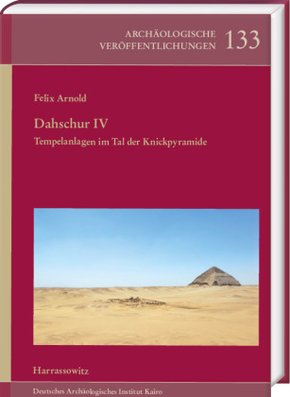
Dahschur IV. Tempelanlagen im Tal der Knickpyramide - mit Beiträgen von Ashraf Senussi
| Verlag | Harrassowitz |
| Auflage | 2021 |
| Seiten | 228 |
| Format | 25,6 x 2,4 x 35,9 cm |
| Gewicht | 1881 g |
| Reihe | Archäologische Veröffentlichungen des Deutschen Archäologischen Instituts 133 |
| ISBN-10 | 3447113456 |
| ISBN-13 | 9783447113458 |
| Bestell-Nr | 44711345A |
Die Knickpyramide in Dahschur war der erste - wenn auch fehlgeschlagene - Versuch, eine geometrisch "echte" Pyramide zu bauen. Sie ist damit ein Denkmal von Weltrang. Im Tal der Pyramide legte Ahmed Fakhry 1951-1955 die Reste eines zur Pyramide gehörenden Tempels frei, auch dieser der älteste seiner Art. Felix Arnold legt nun die Ergebnisse von Nachuntersuchungen vor, die er zwischen 2012 und 2016 im Umfeld des Tempels durchgeführt hat. Der Bau wird umfassend neu dokumentiert und untersucht. Bei Grabungen wurde zudem ein Vorgängerbau des Tempels entdeckt, der eine große Gartenanlage umfasste. Dieser Bau wirft ein völlig neues Licht auf den Ursprung des Tempels und die Entwicklung der ägyptischen Pyramidentempel insgesamt. Untersuchungen im Umfeld des Tempels erlauben zudem eine Rekonstruktion der späteren Nutzungsgeschichte des Baukomplexes. Unter anderem wurden Siedlungsreste des frühen und des späten Alten Reiches identifiziert, die Hinweise auf das Fortbestehen des Kultes im Mi ttleren Reich sowie den Abbau des Tempels im Neuen Reich geben. Die architektonischen und archäologischen Befunde inklusive der bei den neuen Grabungen entdeckten Keramik und Kleinfunde werden umfassend dargestellt und in ihrem historischen und kulturellen Rahmen verortet. Der Band liefert so einen substanziellen Beitrag zur Geschichte der ägyptischen Pyramidentempel.The Bent Pyramid at Dahshur was the first - albeit unsuccessful - attempt to build a geometrically »genuine« pyramid. As such it is a monument of world stature. In the pyramid valley, Ahmed Fakhry in 1951-1955 unearthed the remains of a temple associated with the pyramid; this too is the oldest of its kind.Felix Arnold now presents the results of follow-up investigations which he carried out between 2012 and 2016 in the area surrounding the temple. The building has been thoroughly documented and examined afresh. Excavations revealed furthermore that the temple had a predecessor that incorporated a large garden. This p redecessor building throws completely new light on the origin of the temple and indeed on the evolution of the Egyptian pyramid temple as a whole. Investigations in the vicinity of the temple make it possible to reconstruct the subsequent history of use of the ensemble of buildings. Among other things, settlement remains from the early and late Old Kingdom were identified which indicate the continued existence of the cult in the Middle Kingdom and the dismantling of the temple in the New Kingdom. The architectural and archaeological record including the pottery and small finds discovered in the new excavations is presented in full and placed in its historical and cultural context. The volume thus makes a substantial contribution to the history of the Egyptian pyramid temple.
